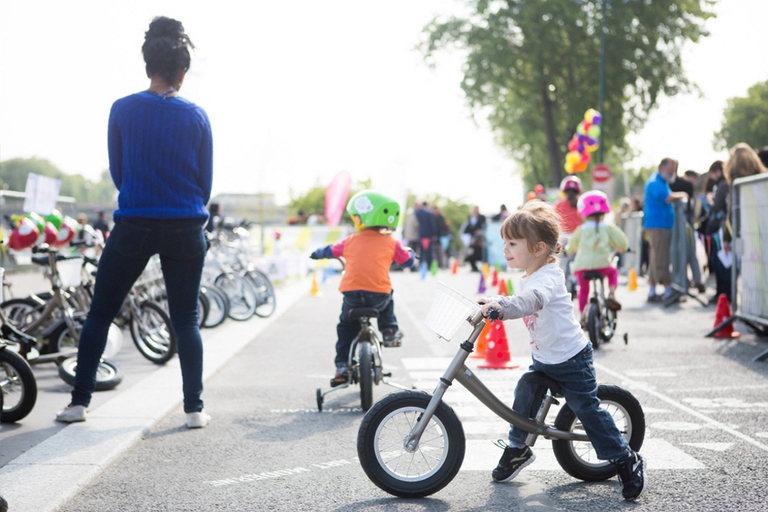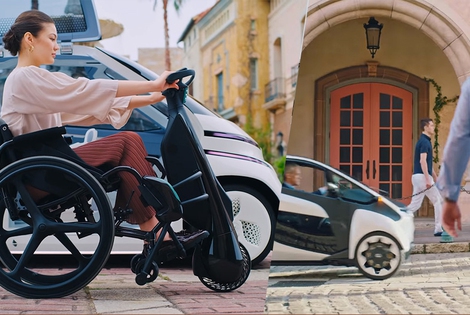
Milan has announced one of Europe’s most ambitious mobility schemes, known as Strade Aperte (open roads). Its goal is to reduce cars in phase 2 of the lockdown by increasing bike lanes and pedestrian areas.
Paris is increasingly embracing soft mobility, that’s why it created a special cycle-sharing service. Following the day without cars in late September, the Champs-Élysées were crowded with people, resulting in an increase by 32 percent in the use of bike-sharing service Vélib compared to a usual Sunday. Similarly, Paris’ white night, organised in October, encouraged citizens
Paris is increasingly embracing soft mobility, that’s why it created a special cycle-sharing service. Following the day without cars in late September, the Champs-Élysées were crowded with people, resulting in an increase by 32 percent in the use of bike-sharing service Vélib compared to a usual Sunday. Similarly, Paris’ white night, organised in October, encouraged citizens to get on their bikes.
Given the bike-sharing’s success, the municipality decided to extend P’tit Vélib to children who want to learn, that are learning or already know how to ride a bike.
Through this service, the French capital inaugurates a new era to promote soft mobility and allow children to learn to use a bicycle safely. The P’tit Vélib service offers four sizes of bicycles for children from two to eight years old.
“La Draisienne” is the bicycle without pedals, suitable for very young children aged 2 to 4 that are learning how to balance themselves on the seat and useful to let them to toddle.
The model for children aged 3 to 5 has two small wheels and two 12-inch wheels. For elder children that can ride a bike two models with 16-inch or 20-inch wheels are available. These bikes are located in some of Paris’ green spaces and pedestrian areas. The first thirty minutes are free, the next hour cost 2 euros.
Since good habits are learned at a tender age, this project aims to encourage young Parisians to use environmentally friendly means of transport.
Siamo anche su WhatsApp. Segui il canale ufficiale LifeGate per restare aggiornata, aggiornato sulle ultime notizie e sulle nostre attività.
![]()
Quest'opera è distribuita con Licenza Creative Commons Attribuzione - Non commerciale - Non opere derivate 4.0 Internazionale.
Milan has announced one of Europe’s most ambitious mobility schemes, known as Strade Aperte (open roads). Its goal is to reduce cars in phase 2 of the lockdown by increasing bike lanes and pedestrian areas.
Formula 1, the world’s most important auto racing championship, has decided to turn the page and aim for carbon neutrality with the support of its teams, drivers and the whole racing circus.
Toyota and LifeGate began telling the story of hybrid mobility back in 2006, now, on the road to the Tokyo 2020 Olympics, they’re still treading the path of sustainable mobility. Here are the main steps of the journey.
Germany’s first solar bicycle lane could be the prototype for the roads of the future. The photovoltaic tiles melt snow and ice, and are capable of absorbing noise.
The Vespa is back in an electric version. Production has just started and the first models can be reserved online starting from October.
The city of Utrecht, in the Netherlands, is home to a bridge for cycling and walking that stretches over roof garden of a Montessori school. This project enhances practicality and will allow families to bring children to school by bike, passing through green areas. Despite their functionality, bridges are often seen as an infrastructure that is
The Lego hair bike helmet is the latest Internet craze. For now it’s just a prototype but production on a large scale will probably start soon.
Just as fires often give way to new growth, after the Dieselgate scandal, which saw Volkswagen cheating on US emission rules, the German car manufacturer radically changed course, beginning to focus on sustainable mobility. The German car company aims to propose thirty zero-emission models and produce at least one million battery electric vehicles by 2025. An ambitious mission
Sustainable, two-wheel mobility is triumphing in Copenhagen. After years of investments, policies, and infrastructural changes, bikes now outnumber cars in the city centre. The website Copenhagenize has released data linked to the number of vehicles entering the city centre, which are monitored by the city’s administration on a daily basis. Last year, 265,700 bikes have entered








